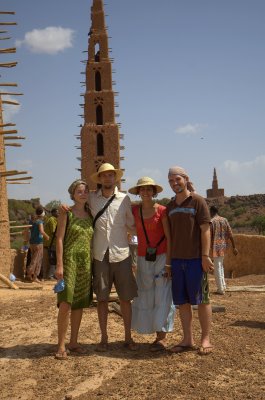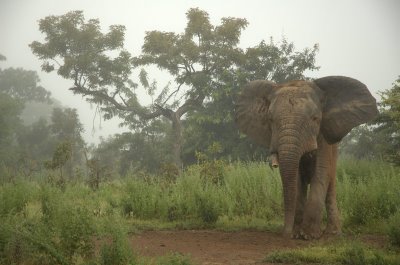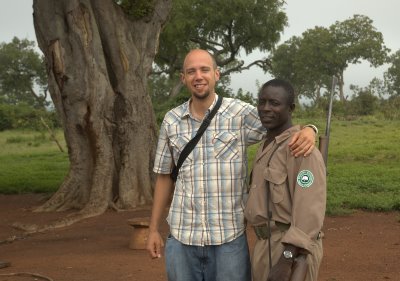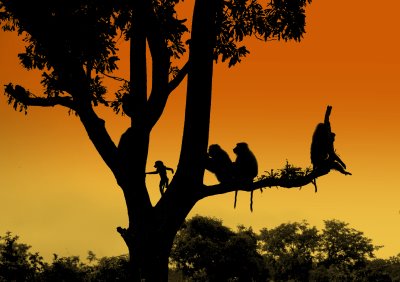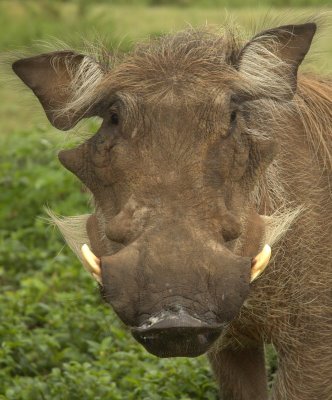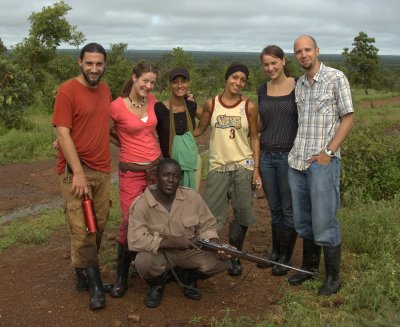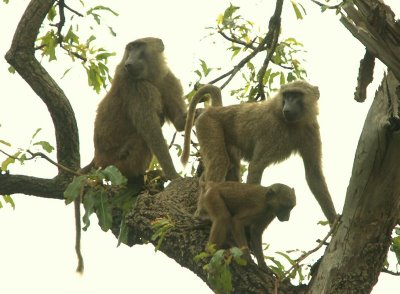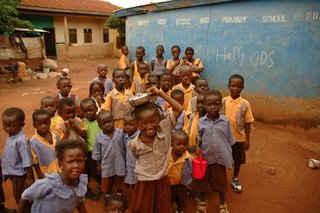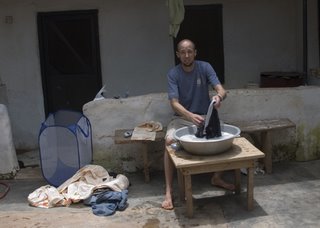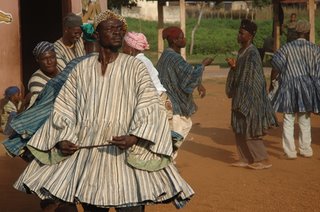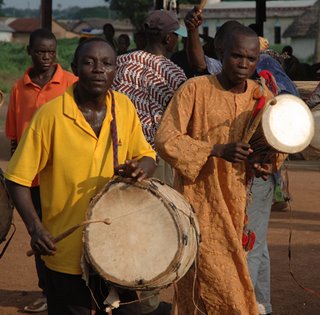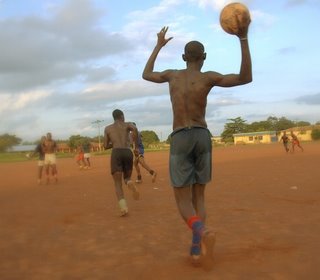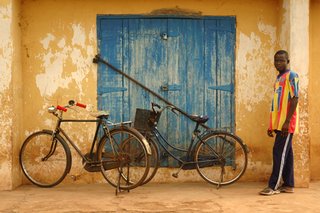Leaving Mother Ghana!
For those of you who don’t know that I’m already home, its official! I touched down in Toronto just one week ago and I’m beginning the long and interesting process of ‘re-integration’ and ‘reverse culture shock’. I’ll write more on my re-entry later, however for now here is a bit that I wrote while on my way back home. Can’t wait to see you all soon!
- Christian
What a long and strange trip it’s been! As I sit here in the Kotoko airport in Accra waiting for the first of three flights that will take me back home, I can’t help but think of all the great things I am leaving behind in the Ghanaian motherland. It saddens me to think that I will be so far from my new friends, yet I’m excited to see my family again. I have definitely found my work here to be challenging, and I am ready for a small break. So as you can imagine my feelings are mixed.
 My last STC ride from Tamale to Accra
My last STC ride from Tamale to Accra
During this last week in Ghana I experienced a rapid transition back into a more ‘western’ atmosphere. I was very lucky to get one of the few working STC buses from Tamale, and made it to Accra in just over 16 hours – no breakdowns! It was a miracle. Accra is the first and last bit of Ghana that you see, and it is in many ways a strange experience to be in a very developed city just before heading home. I have spent the past week working with the MOFA national office staff, and had a few days to check out the big city. 
The most striking feature of my last week was realizing just how vastly different life is in the south, especially in Accra, compared to the Northern Regions of Ghana. While visiting the towns of Cape Coast and Takoradi in April, I saw that though they were more ‘developed’ than Tamale, there were still many reminders of rampant poverty. However in Accra there are so many differences from the North that it feels like an oasis of sorts. You can buy pretty much anything available on the international market, and can even spend a relaxing day on the beach. The taxis and tro-tros here are actually in great shape and well maintained! Big change from Tamale!
 Travel and See!
Travel and See!
Here in Accra I have seen many areas of town that look exactly like your average North American or European city. Whether that’s a good thing or not, I’m not so sure. What it does say is that there is money here. On one street you have ‘Busy Internet’, a top of the line internet café with all the newest computers and gadets. Across the street is NIIT, the National Institute of Information Technology, and just up a ways are all of the big banks and airline offices. It all looks much like you would see back home in Canada. When you hear of Ghana growing in terms of GDP, Accra is probably the place they are talking about!
 Last night out with friends in Tamale
Last night out with friends in TamaleWhat the stats don’t show you though is that while many are doing well, so many are still struggling. Just a few blocks over from the nice shops and offices are thousands of people selling small things in the streets and markets at ‘Kwame Nkrumah Circle’ for little more than ‘chop money’ (money for food). So many are living on so little. Add the small income to the inflated prices in the big city and you have a lot of people who are struggling.
 MoFA Directors gave me a Dagomba smock!
MoFA Directors gave me a Dagomba smock!
Like a lot of the signs of poverty in the rest of Ghana, poverty in the city is often ‘a few streets over’ and not always visible to those who are doing well. It is easy to be biased by the allusions of affluence in Accra. My biggest concern is that those who are doing well don’t have a good understanding of what poverty truly is, what people want and need to move forward. Even if you do recognize the challenges of poverty in the city, there is a good chance that you feel a bit helpless in improving the situation. It is that big a challenge.
 My last supper - Mmmm Tilapia
My last supper - Mmmm Tilapia
I was surprised at how quickly I assumed that the development of the big city meant a higher standard of living and more opportunities. I realized in small time that I should not be fooled by such a trick. Behind all of the statistics showing improvement, the economic growth rate and whatnot, are the people who are living more challenging lives than can possibly be described in numbers. My fear is that we in the ‘west’ may perpetuate our complacency with the situation in developing nations by being fooled by the numbers. My time here showed me the faces of the people who are living hand to mouth with little opportunity to choose healthier and more secure lifestyles. Let me tell you, development is about people, real people who live with much less than we wish to imagine.
Could this week’s experience be a small taste of what is to come in Canada? How do we see extreme poverty back home anyways? How can I relay what I have experienced and encourage people to become conscious of such extreme poverty? How can Canadians make development aid a priority of our government? I’m not sure I remember what it is like to live in a developed nation and to be so far removed from the challenges of the developing world. I hope that my ‘re-entry’ experience in Canada will help me to find some answers to these daunting challenges.
 Last sights in Ghana
Last sights in Ghana
Looking forward to seeing you all soon!!!
- Christian








 Ghana is now the home to a wealth of vibrant cultures and tribes living in harmony together, and steady development has resulted in a significant and promising decline in poverty across the country. Tremendous success in the recent 2006 World Cup embodied Ghana’s strength and determination to succeed. She is the motherland of the former UN Secretary General Kofi Annan, home to high life music and incredible drummers, and is the ‘black star’ of West Africa.
Ghana is now the home to a wealth of vibrant cultures and tribes living in harmony together, and steady development has resulted in a significant and promising decline in poverty across the country. Tremendous success in the recent 2006 World Cup embodied Ghana’s strength and determination to succeed. She is the motherland of the former UN Secretary General Kofi Annan, home to high life music and incredible drummers, and is the ‘black star’ of West Africa.
 I left my house this morning a bit too late to get a seat in the shade, but myself, my host family, and a few EWB friends made it in town just in time to see the start of the celebrations. The police park was filled with thousands upon thousands of people, and groups of local drummers played throughout the crowd. Much of the marching square in the center held members of the military and police who were on parade, and scores of school children, marching bands, and even the ‘Zoomlion’ street cleaning crew were all lined up to march through the square. To be honest, the event was a little bit un-eventful, since the speakers set up for the minister’s address could not be heard in the crowd, and the parade was difficult to see because of the crowd. But other than that it was quite amazing to be a part of such a huge celebration, and to see how excited people were.
I left my house this morning a bit too late to get a seat in the shade, but myself, my host family, and a few EWB friends made it in town just in time to see the start of the celebrations. The police park was filled with thousands upon thousands of people, and groups of local drummers played throughout the crowd. Much of the marching square in the center held members of the military and police who were on parade, and scores of school children, marching bands, and even the ‘Zoomlion’ street cleaning crew were all lined up to march through the square. To be honest, the event was a little bit un-eventful, since the speakers set up for the minister’s address could not be heard in the crowd, and the parade was difficult to see because of the crowd. But other than that it was quite amazing to be a part of such a huge celebration, and to see how excited people were.


 Then low and behold, George Roter, co-CEO of EWB came running from out of nowhere and greeted Luke, Kristy Minor (another great EWB’er in Tamale), and I, and we chatted all about our adventures in the first 5 months in Tamale. Before long the Governor General made her way over to us, and then it happened – we officially met the GG of Canada! WOW! It was pretty cool. We chatted for a while about EWB, and joked about how my name was about as French as it gets, but I can’t even order poutine properly in Quebec. She told us how amazing our work was here in Ghana and in the rest of Africa. It turns out that she specifically asked the EWB CEOs to join her tour of Africa, and wanted to learn more about what EWB does. Goes to show you just how much incredible energy, enthusiasm, and heart EWB has tapped into with so many young adults across Canada!
Then low and behold, George Roter, co-CEO of EWB came running from out of nowhere and greeted Luke, Kristy Minor (another great EWB’er in Tamale), and I, and we chatted all about our adventures in the first 5 months in Tamale. Before long the Governor General made her way over to us, and then it happened – we officially met the GG of Canada! WOW! It was pretty cool. We chatted for a while about EWB, and joked about how my name was about as French as it gets, but I can’t even order poutine properly in Quebec. She told us how amazing our work was here in Ghana and in the rest of Africa. It turns out that she specifically asked the EWB CEOs to join her tour of Africa, and wanted to learn more about what EWB does. Goes to show you just how much incredible energy, enthusiasm, and heart EWB has tapped into with so many young adults across Canada!

 This is a big step forward in MoFA, since data collection, analysis, and reporting has previously been done entirely on paper. Each report would normally take weeks to complete, and did not enable officers to analyze their performance and fine tune their focus in the field. So far the project is moving forward really well, and the results are promising! If all goes well, we will introduce our new ‘system’ to the national office in the next two weeks, where we hope to share our successes with the other regions.
This is a big step forward in MoFA, since data collection, analysis, and reporting has previously been done entirely on paper. Each report would normally take weeks to complete, and did not enable officers to analyze their performance and fine tune their focus in the field. So far the project is moving forward really well, and the results are promising! If all goes well, we will introduce our new ‘system’ to the national office in the next two weeks, where we hope to share our successes with the other regions.
 As the boat arrived, all of the villagers came out and began pulling in the boat and offloading the massive nets filled with writhing, silvery life. Everyone had a job – the men hauled the fish nets away from the surf and the women and children all sifted through the jumping and shaking fish to separate the big from small. The kingfish, barracuda, and other big ones were sent to the women, and the children took the squid and began to clean them. The children carefully stuffed the squid with sand to take away the slime, then began peeling away the skin, and finally removed the ink sack to spill it back into the sea. The men tended to the nets and the boat once the fish were sorted.
As the boat arrived, all of the villagers came out and began pulling in the boat and offloading the massive nets filled with writhing, silvery life. Everyone had a job – the men hauled the fish nets away from the surf and the women and children all sifted through the jumping and shaking fish to separate the big from small. The kingfish, barracuda, and other big ones were sent to the women, and the children took the squid and began to clean them. The children carefully stuffed the squid with sand to take away the slime, then began peeling away the skin, and finally removed the ink sack to spill it back into the sea. The men tended to the nets and the boat once the fish were sorted.  Some cleaned seaweed from the nets while the others hauled the ship on shore using logs to help it slide. In all thirty or more people made it all happen, and in thirty minutes they were all back at the village with their catch.
Some cleaned seaweed from the nets while the others hauled the ship on shore using logs to help it slide. In all thirty or more people made it all happen, and in thirty minutes they were all back at the village with their catch.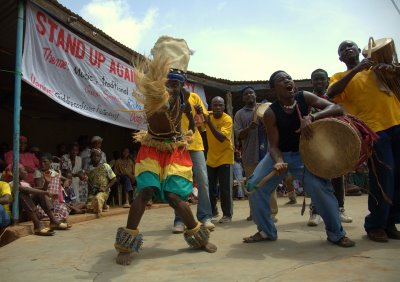 It was incredible! The day included performances by local drummers, a crew of dancers and musicians from the Tamale Youth Home Cultural Group, along with an unscheduled pre-show performance by a horde of 'small' boys and girls breaking it down to some Akon and Bob Marley. The crowed was addressed in Dagbani by Madaam Elizabeth, the Regional Gender Desk Officer, and by MC Ricky from Diamond FM, along with readings of the Millennium Development Goals from local youth.
It was incredible! The day included performances by local drummers, a crew of dancers and musicians from the Tamale Youth Home Cultural Group, along with an unscheduled pre-show performance by a horde of 'small' boys and girls breaking it down to some Akon and Bob Marley. The crowed was addressed in Dagbani by Madaam Elizabeth, the Regional Gender Desk Officer, and by MC Ricky from Diamond FM, along with readings of the Millennium Development Goals from local youth. 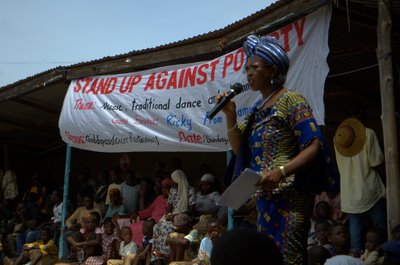 It was AWESOME! We hope that our message is heard loud and clear – we want action, and want to see leaders in both the developing and developed world get serious about meeting the MDGs. For a look at exactly what the Stand Up Against Poverty campaign was all about, check out:
It was AWESOME! We hope that our message is heard loud and clear – we want action, and want to see leaders in both the developing and developed world get serious about meeting the MDGs. For a look at exactly what the Stand Up Against Poverty campaign was all about, check out: 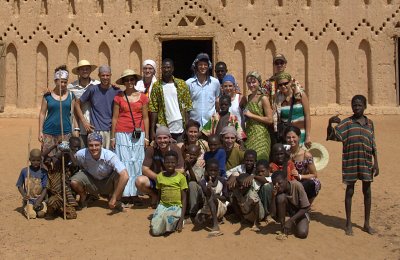 It was a nice break from the staple yam or rice meal here for me. It was the end of Ramadan at the time, and since we weren’t at our own homes to enjoy the traditional celebrations, we had one of our own. Families will often slaughter a goat or lamb for everyone to share, and so we found one at the market and had a local restaurant ‘prepare’ it for us. I’ve got to say, it was pretty tough seeing the goat take its last walk on the way to the butcher!
It was a nice break from the staple yam or rice meal here for me. It was the end of Ramadan at the time, and since we weren’t at our own homes to enjoy the traditional celebrations, we had one of our own. Families will often slaughter a goat or lamb for everyone to share, and so we found one at the market and had a local restaurant ‘prepare’ it for us. I’ve got to say, it was pretty tough seeing the goat take its last walk on the way to the butcher!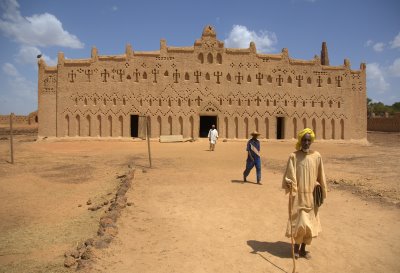 On an early morning run with my friends Katherine and Monica, we discovered deep sand along the trails leading from town, and scenery similar to what you might see while on an East African safari. We found an early morning caravan of traditionally clothed women carrying water on their heads from a small ‘oasis’ to a nearby village. We greeted them, then continued to run towards the village of mud huts in the distance.
On an early morning run with my friends Katherine and Monica, we discovered deep sand along the trails leading from town, and scenery similar to what you might see while on an East African safari. We found an early morning caravan of traditionally clothed women carrying water on their heads from a small ‘oasis’ to a nearby village. We greeted them, then continued to run towards the village of mud huts in the distance. 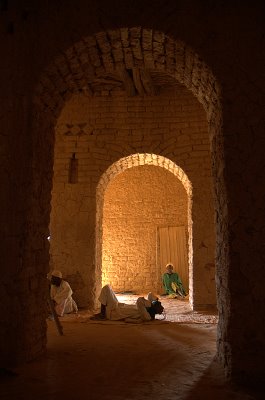 We ran past fields of millet, neatly arranged with small purple flowers growing at the base of every plant. We saw groups of small children riding donkeys, pulling carts with sacks of grain, herding cattle, and fetching water. Finally with the sun rising we were forced to turn back to Dori to grab something do drink! It was an absolutely surreal experience, and one of the most interesting ‘exploratory runs’ that I have been on.
We ran past fields of millet, neatly arranged with small purple flowers growing at the base of every plant. We saw groups of small children riding donkeys, pulling carts with sacks of grain, herding cattle, and fetching water. Finally with the sun rising we were forced to turn back to Dori to grab something do drink! It was an absolutely surreal experience, and one of the most interesting ‘exploratory runs’ that I have been on.